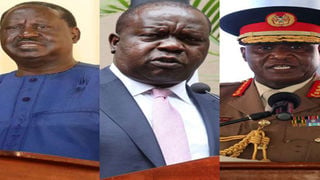
From left: ODM leader Raila Odinga, Interior Cabinet Secretary Fred Matiang'i, General Robert Kibochi, and Jubilee Party Vice-Chairman David Murathe.
| File | Nation Media GroupPolitics
Premium
The President’s men: A glimpse into Uhuru’s inner circle
What you need to know:
- President Uhuru Kenyatta and ODM leader Raila Odinga hold frequent private meetings and are behind the biggest political project currently; the Building Bridges initiative.
- Ms Nancy Gitau was one of the coordinators of Mr Kenyatta's presidential elections in 2013 and 2017.
Shortly after President Uhuru Kenyatta was sworn in for his second term in 2017, Jubilee Vice-Chairman David Murathe warned that the country should expect to see a different head of State – one more forceful, rigorous and ruthless.
President Kenyatta has not disappointed, if the latest kicking out of rebels within the Jubilee party is anything to go by, more so, his falling out with his deputy, William Ruto.
By striking a working deal with opposition leader Raila Odinga and reorganising his government under Interior Cabinet Secretary Fred Matiang’i, the President not only side-lined his deputy, but left him with no substantive portfolio.
Previously, Dr Ruto was the main cog in the Jubilee wheel. Not any more.
The exit of Dr Ruto from the centre stage of President Uhuru’s second term led to a reorganisation of the inner circle, bringing in new faces and retaining some.
A president’s inner circle has a bearing on his policies and decisions as he relies on this set of official and unofficial advisers to shape policy, politics and the direction of the country.
It also determines who gets appointed where and their brief after appointment. The Nation brings you the men and women in the President’s circle based on interviews with leaders, a CS, two PSs and parliamentary leadership.
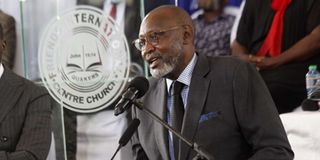
Muhoho Kenyatta.
Muhoho Kenyatta
For the two terms, Mr Muhoho, the President’s younger brother, has been a key figure in the Uhuru administration. Also known as MK in power circles, he is one of the influential men in Jubilee.
The 56-year old alumnus of William College in the US and St Mary’s School in Nairobi has not only the President’s ear but that of the government’s bureaucracy. MK and intelligence chiefs played a role in the handshake between Mr Kenyatta and Mr Odinga, which changed the course of Kenya’s politics.
Though he hardly appears in political rallies, he, in 2019, represented the Head of State at the 25th memorial service of the late Jaramogi Oginga Odinga in Bondo.
The conservative MK, who abhors the media limelight (despite the family owning a media house) also sits in boards of companies to represent the family interests and is the Mr Fix-it in sensitive situations that require high-level contacts and secrecy.

Orange Democratic Movement leader Raila Odinga.
Raila Odinga
Since his entry via the handshake in 2018, the 76-year-old Orange Democratic Movement leader has become the new political wingman of the President, replacing Ruto. Politicians who want favours from the State troop to his Capitol Hill office for a meeting.
The German-trained engineer is one of the new men surrounding the Head of State whose stature keeps growing every day.
The former Prime Minister and Mr Kenyatta also hold frequent private meetings and are behind the biggest political project currently; the Building Bridges initiative.
Once the party leader of the Liberal Democratic Party, Mr Odinga has described himself as a social democrat and cut his teeth in the fight for multi-party in the 80s and 90s. He has contested for the presidency four times, narrowly missing it in 2007.
The election was disputed, leading to post election violence that resulted in a coalition government in which Mr Odinga was named the Prime Minister.
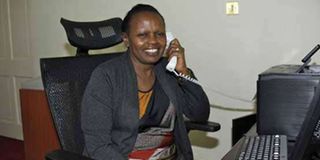
Nancy Gitau.
Nancy Gitau
Despite politically advising two presidents, the media has only two photos of Nancy Gitau; and that is how she likes it.
Ms Gitau was one of the coordinators of Mr Kenyatta's presidential elections in 2013 and 2017. She was briefly forced out of power by Dr Ruto’s men after the 2013 elections, but came back, and the DP’s men blame her for their woes in government.
The conservative politically battle hardened Ms Gitau has also worked for President Mwai Kibaki and has propped up the Kieleweke grouping that is opposed to the DP.

Interior and Coordination of National Security Cabinet Secretary Fred Matiang'i during a press conference at Serena hotel, Nairobi on January 25, 2021.
Fred Matiang’i
In 2019, Interior Cabinet Secretary Fred Matiang’i was appointed supervisor of government projects. He chairs the National Development Implementation and Communication Committee, composed of Cabinet secretaries, the attorney-general and head of public service, which monitors the implementation of government projects.
He is the wheel that turns the government and administratively, is only second to the President. This is in addition to his role as Interior minister, overseeing a vast network of forces with tentacles across the country.
Before he was picked to join the Cabinet in 2013, Dr Matiang’i was an academic and also served as an aide of former minister Simeon Nyachae. An elder in the Seventh Day Adventist church, the conservative Matiang’i has also served as a CS in the ministries of ICT, Education and Lands.
Dr Matiang’i has a PhD in Communication and Comparative Literature from the University of Nairobi, an M.A. in English from the University of Nairobi, and a Bachelor of Education degree from Kenyatta University.
Before his appointment, Dr Matiang’i was the regional representative in East Africa for the Centre for International Development, Rockefeller College of Public Affairs and Policy, the State University of New York (SUNY/CID). He formerly served as chief of party for Kenya's Parliamentary Strengthening Programme.
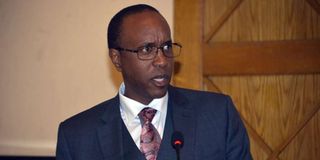
Njee Muturi
Njee Muturi
Though he is the deputy chief of staff, Mr Muturi’s power is projected beyond the walls of State House to institutions such as Parliament, where he bulldozes leaders to back government agenda. The Jubilee leadership dreads his calls and visits to the House.
He has also served as Kenya’s Solicitor General and accounting officer at the State Law Office. For 11 years, he was the personal assistant of Mr Kenyatta. The Muturis are not strangers to power.
Muturi wa Njee, his father, served as personal assistant for Mzee Jomo Kenyatta – Kenya’s first president and father of the current one.
He holds a Bachelors of Economics & Political Science and Bachelor of Laws from India, and is an alumnus of St Mary’s School, like his boss President Kenyatta.

Major-General Philip Wachira Kameru (left) and General Robert Kibochi.
Major-General Philip Wachira Kameru and General Robert Kibochi
As the National Intelligence Service (NIS) director-general, Maj-Gen Kameru has unfettered access to the President and regularly briefs him on the state of security, politics, international affairs and other issues.
From the Kenyatta, Moi, Kibaki and Kenyatta administrations, the spy-in-chief has wielded immense influence in government and this financial year, controls a Sh40 billion war chest. President Kenyatta has a particular liking for appointing spies in influential positions, courtesy of Mr Kameru, whose five-year term was renewed in 2019.
General Kibochi took over as the Chief of Defence Forces from General Samson Mwathethe at a time when the military is taking an increasingly role in infrastructure development and running the government through military appointees. Born in August 1959, the general went to Koelel Boys, the secondary school inside the Gilgil military barracks.
A father of four, he has a Bachelor's degree in technology, communication and electronics engineering, a Master of Arts in international studies and another Master's in computer-based information systems. General Kibochi created history by becoming the first non-infantry officer from the Kenya Army to be appointed military boss.
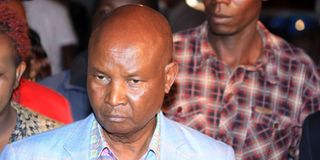
State House Comptroller Kinuthia Mbugua.
Kinuthia Mbugua
As the Comptroller at State House, he controls who sees the Head of State, and his diary. The former Nakuru governor is credited for cracking the whip on a discordant State House team after the re-election of President Kenyatta.
He has increasingly become powerful, after taking over the role of officials who were sidelined in the past two years. Mr Mbugua served as Administration Police commander during the controversial 2007 elections, where officers under his command were accused of being used to rig the election, which was followed by violence. Mr Mbugua has served as a district officer and a district commissioner in the former Central and Rift Valley Provinces.
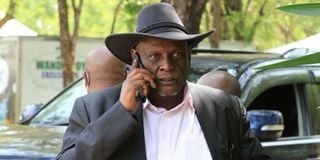
Jubilee Party Vice-Chairman David Murathe.
David Murathe
Even before he became president, journalists who wanted to know how Mr Kenyatta’s views knew the man to call; Jubilee Party Vice-Chairman David Murathe. Even after Mr Kenyatta became President, Mr Murathe has retained his political influence inside and outside the government.
He has confessed that he even acts as a liaison for mostly Chinese investors who want to do business in the country. Mr Murathe is the man who first alerted the country to the frosty relationship between the President and his deputy and has repeatedly said that Mr Kenyatta will not support his deputy’s presidential bid despite a promise to do so years ago.
The former Gatanga MP was involved in a tiff with Royal Media Services boss SK Macharia after the 1997 elections after the media owner claimed that he had paid Mr Murathe to step down in his favour, claims that Mr Murathe denied.
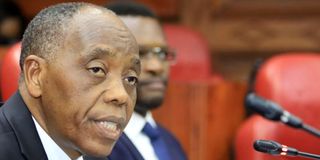
Head of Public Service Joseph Kinyua.
Joseph Kinyua
The ageing career civil servant is the nuts and bolts that keeps the civil service humming and implementing Cabinet decisions.
As the head of the Civil Service, he is central to securing appointments within the service and the making of careers of many civil servants. Despite his previous attempts to retire, President Kenyatta has renewed his contract and previously described him as “one of the most honest and dedicated people” he knows.
The holder of a BA and MA in Economics from the University of Nairobi was supposed to retire at the age of 60 almost 10 years ago, but has been retained by both the Kibaki and Kenyatta administrations for his knowledge of the bureaucracy that is government.
He has served as PS in the ministries of Agriculture, Finance and Planning. Activist Okiya Omtata has a case challenging his appointment on account of his age.
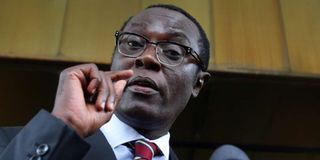
Political Scientist Mutahi Ngunyi.
Mutahi Ngunyi
He popularised the “tyranny of numbers” concept, predicting that Jubilee would win the elections in 2013. But before then, the political scientist created a legion of followers for his Sunday Nation column. He owns The Consulting House, a consultancy on politics and conflict resolution.
And now, Dr Ngunyi has taken his political science to State House and is a constant feature during media interviews and political meetings by the President. The scholar also runs a TV channel focusing on politics.
The hawkish father of three has clashed with other intellectuals, including economist David Ndii, who questioned Dr Ngunyi’s credentials in heated twitter spats. Little is known about Dr Ngunyi’s past, although he has previously said he grew up in Nairobi’s Eastlands and was one of the Sheng language “pioneers”.
He was a church pianist from the age of 13 and that is where he met his wife. He studied at St Thomas Aquinas before going to study history at university.





